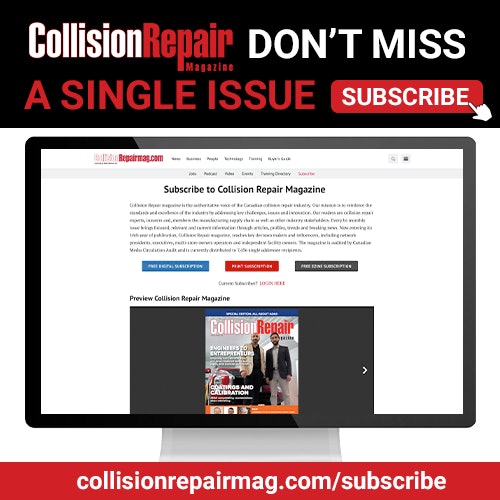
“A comedy of errors" led to a freeway being covered in rising bread dough earlier this week.
By Jeff Sanford
Toronto, Ontario — August 4, 2017 — In this week’s edition of Friday Fun we have a highway of rising dough, an industry meltdown in Germany, Apple’s solution to distracted driving and much, much more.
– “A comedy of errors” led to a freeway being covered in rising bread dough earlier this week. As the temperature hit 30 C in Washington state, a truck transporting leftover bread dough from a bakery got stuck in traffic on an interstate near Tacoma. The dough began to rise in the heat and ended up scattered across the highway. A source quoted stated, “I think the combination of the yeast, heat and the length of time that he was on the freeway, it just reached a boiling point, I guess, and made the dough rise… When I got there, there was just massive amounts of dough falling from plastic bags and swelling the plastic bags to a bursting point, dropping in big, basketball-sized chunks all over the freeway.”
– A report in UK newspaper, The Telegraph, finds that campaigners are calling for insurance firms to “scrap secret rates for some car repairs while charging double for others.” According to the report, “The underhand dealings are said to have created a two-tier system for ‘at fault’ and ‘non-fault’ claims.” According to the National Body Repairers Association, rival insurance firms rip each other off when charging for repairs if the driver in question is “blameless.” According to critics the collision repair centres are forced to agree to, “side deals, including discounted rates for parts and labour with body repair shops when dealing with non-fault claims… The hidden costs—said to be worth £750 million—are the equivalent of around 5 percent of the UK’s 34 million drivers’ annual insurance premiums,” according to the report.
– Analysts say the used car industry has been flooded with a, “growing glut of returning off-lease vehicles.” But while the market has managed to absorb the flood so far, this may not be the case for the rest of the year. As it is, the number of off-lease vehicles returning to market will continue to rise, “putting more downward pressure on pricing.” According to a source, those selling used cars can expect an “acceleration in vehicle-price depreciation throughout the second half of the year and into early 2018, when large numbers of fleet vehicles will enter the market… As we move on through the rest of this year, used cars will be increasingly challenging.”
-Democratic lawmakers in the U.S. are pushing for a chance to question Wells Fargo executives about sales practices that saw employees force auto insurance on borrowers who did not need policies. Wells Fargo is already in trouble for signing clients up for unwanted services in an attempt to increase service fees. It turns out the devious practice extended to insurance products as well. Last week it emerged the bank faces a lawsuit accusing the firm of forcing clients to pay for unnecessary auto insurance that “drove some clients so far into a financial spiral that their vehicles were repossessed.” According to a report the bank’s practice of forcing clients into unneeded insurance policies saw almost 250,000 clients pushed into delinquency, with almost 25,000 of these clients suffering through a vehicle repossession as a result. The claims are contained in a proposed class-action lawsuit filed last week in San Francisco. Over the past year it has become clear that employees at Wells Fargo “created unauthorized accounts to hit sales goals handed down by management. The creation of fake accounts and misplaced insurance charges went on for years before the bank’s management took action.” In the case of auto insurance it was often the case that, “the bank and the insurance company either didn’t check whether clients already had coverage or ignored the information,” according to the complaint. Collateral protection insurance policies were created for customers, and Wells Fargo would add premium charges to customers’ auto loan bills, often without notifying them.” The bank found that more than 500,000 clients may have unwittingly paid for protection against vehicle loss or damage while making monthly loan payments, even though many drivers already had their own policies, according to the story.
– Also facing recrimination this week is the German luxury car industry. Government officials and industry leaders are meeting at a German auto summit to figure out what to do about the nation’s auto industry, and this is going to be a tough nut to crack. In the wake of the diesel-gate scandal, some German cities are banning cars that run on diesel fuel, an intrinsically a dirtier fuel than gasoline. The industry has long relied on diesel fuel as a primary source of energy. Now it’s clear that German claims that its companies can engineer diesel engines to be clean running are untrue. Germany has long made it a national policy to promote its luxury car makers. To manage that policy, close ties between the industry and the government have become the norm. As politicians are called upon to do something, these ties are becoming a problem. According to a report, it appears “that the German car industry is facing its worst crisis of modern times. The German auto industry is in the process of tearing itself apart.” The populace wants cleaner cities. Industry executives emphasize how important the jobs in the industry are to Germany. Politicians are caught in a tough spot. According to a recent story, “For two years, there’s been a host of negative headlines, almost on a weekly basis. Police raids on Porsche, Mercedes, Audi and VW; diesel car emissions which may soon prevent people from driving in downtown areas. Laws have been watered down; there’s widespread manipulation. It’s not exactly looking good.” This past week the German Transport Minister Alexander Dobrindt had to reject accusations “that he is too closely tied to the country’s car industry,” ahead of a national summit to discuss ways to cut pollution from diesel vehicles. His claims will sound empty to many.
At the same time that German cars account for “one-fifth of the country’s exports. A back and forth between politics and the car industry has been the norm for decades. According to a report, Angela Merkel’s Minister of State is now chief lobbyist for Daimler—as was Martin Jäger, a former spokesperson for the Federal Foreign Office who is now at the Interior Ministry for the state of Baden-Württemberg… Thomas Steg, a former government spokesperson, holds that job title for VW. Matthias Wissmann was a member of parliament for more than 30 years before becoming president of the German Automobile Industry Association, a position he has held for a decade.” That is, in Germany the state is tied closely to the auto industry. Germany has been held up as an example of a country that managed to hold on to manufacturing jobs (while other countries offshored their production to China. At times in the past German state government have held actual equity stakes in the big Germany auto makers (sometimes up to 20 percent of the total market cap of the companies). In return the automakers made political donations to political parties. Now, in the wake of the emissions scandal, the entire German state-auto corporation complex—for so long championed as an example of a western manufacturing sector that works—has taken on a new and seedy reputation. “From a valuation standpoint, I have never seen an industry which is as little loved as being an OEM today. For a period of time I thought that banking had reached the bottom but I think we have now surpassed them in terms of dislike,” says a source quoted in the story.
– The Aluminum Association Auto & Light Truck Group commissioned a recent study to determine the latest aluminum content per vehicle in North America between 2016 and 2020. According to the report vehicles are expected to be reduced by 7 percent of their current average weight (270 net pounds per vehicle) by 2025. According to the report, “Pickup trucks, large cars and SUVs, minivans and electric vehicles will bear most of the burden. Nearly 20 percent of the vehicles are likely to reduce mass by 20 percent.” Much of this light weighting will be done through the adoption of aluminum. “Fifty percent of total aluminum content growth over the next five years will be driven by aluminum foreclosures, crash management, steering knuckles and structural vacuum die cast parts,” according to the report. “The average aluminum content for five OEMs in 2020 will be over 600 pounds per vehicle.”
– Many have been surprised to see the number of traffic deaths rising over the last couple of years. Many would have predicted the number of deaths might decrease as a result of new safety features, but the reverse has been the case—total deaths have been rising. A new study out from the National Transportation Safety Board (NTSB) finds the most common cause of auto deaths is from speeding. The organization suggests a way to limit these deaths by increasing penalties for speeding to parity wit the penalties for drunk driving. According to a report, “The study looked at U.S. passenger vehicle crashes from 2005 to 2014 and found that speeding was the main factor in 112,580 deaths, or about 31 percent of all traffic fatalities. One of the major recommendations from the NTSB is to change the consequences for speeding to match that of a DUI. National campaigns have also successfully created a cultural stigma around driving drunk, yet a similar approach has not been taken to raise awareness about the dangers of speeding.” The story goes on to say that, “Back when highways were first built, traffic engineers observed the speed of drivers on the mostly rural roads and set limits meant to encompass a speed the majority of the cars were going—about 85 percent, which is why this practice is called the ’85 percentile rule. The 85 percentile rule has been adopted as policy in most states, and has been extrapolated to define standards for acceptable speeds on a wide variety of roads. But as the NTSB report admitted, this policy doesn’t make any sense when it comes to saving lives, and needs to be revisited.”
– Has Apple solved the distracted driving issue? The company is expected to release iOS 11 soon. The operating system will have a new feature that will allow users to initiate a “do not disturb while driving” mode while driving. The mode prevents any notifications appearing on the device. The hope is that this takes away the “temptation” to look at Smartphones while driving. The phone also has the ability to figure out (through GPS and WiFi) when it’s moving, and can turn itself off. Trying to “unlock” the phone while driving will be “purposefully” difficult to unlock according to a report.























